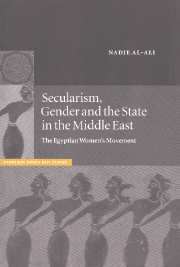Book contents
- Frontmatter
- Contents
- Acknowledgements
- Note on transliteration
- List of groups, networks and organizations
- List of abbreviations
- Introduction
- 1 Up against conceptual frameworks: post-orientalism, occidentalism and presentations of the self
- 2 Contextualizing the Egyptian women's movement
- 3 Self and generation: formative experiences of Egyptian women activists
- 4 Secularism: challenging neo-orientalism and ‘his-stories’
- 5 From words to deeds: priorities and projects of contemporary activists
- 6 A mirror of political culture in Egypt: divisions and debates among women activists
- Conclusion: ‘standing on shifting ground’
- Bibliography
- Index
- Other books in the series
1 - Up against conceptual frameworks: post-orientalism, occidentalism and presentations of the self
Published online by Cambridge University Press: 22 September 2009
- Frontmatter
- Contents
- Acknowledgements
- Note on transliteration
- List of groups, networks and organizations
- List of abbreviations
- Introduction
- 1 Up against conceptual frameworks: post-orientalism, occidentalism and presentations of the self
- 2 Contextualizing the Egyptian women's movement
- 3 Self and generation: formative experiences of Egyptian women activists
- 4 Secularism: challenging neo-orientalism and ‘his-stories’
- 5 From words to deeds: priorities and projects of contemporary activists
- 6 A mirror of political culture in Egypt: divisions and debates among women activists
- Conclusion: ‘standing on shifting ground’
- Bibliography
- Index
- Other books in the series
Summary
As I think about the question of how post-colonial scholarship has influenced more recent works about the ‘East’, and also ponder on the gains and pitfalls of post-orientalist scholarship, I come across Edward Said's reassuring words in his introduction to Culture and Imperialism (1993): ‘Gone are the binary oppositions dear to the nationalist and imperialist enterprise’ (p. xxviii). This, no doubt, constitutes a radical shift from his earlier account of history and representation (Orientalism, 1978), in which Said stressed that relations between the ‘West’ and the ‘non-West’ have been continuously characterized by conflict, divisiveness and dichotomies as the inevitable consequence of and reaction to colonialism. A sense of relief, almost comfort, arises: are we living in new times in which processes of decolonization within formerly colonized as well as colonizing countries allow reconciliation, liberation and the necessary steps to go beyond essentialisms, hierarchies and binary oppositions?
The feeling of relief vanishes when I put down my books and papers on ‘post-colonialism’ – all full of promising notions of ‘breaking down boundaries’, ‘hybridity’, ‘plural identities’ and ‘cultural interdependencies’. Reading the newspapers or watching television, I feel confronted with a very different language and reality: the ongoing battle of strength between the United States and Iraq (or rather Saddam Hussein, if we want to believe various spokespeople), Nato airstrikes in Yugoslavia, Serb aggression in Kosovo, and the ongoing oppression and humiliation of Palestinians in Israel.
- Type
- Chapter
- Information
- Secularism, Gender and the State in the Middle EastThe Egyptian Women's Movement, pp. 19 - 50Publisher: Cambridge University PressPrint publication year: 2000
- 1
- Cited by

